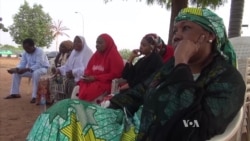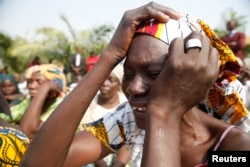In Africa, the story of the Chibok girls represents the struggle to improve the conditions for women: their security, education, and equality. The #BringBackOurGirls movement was created almost two years ago when more than 250 school girls were abducted in Chibok, Nigeria by Boko Haram militants.
Every day at 5:00 pm, the ritual is the same in downtown Abuja: two dozen people gather near the Unity Fountain, a monument celebrating the federation of Nigeria's states.
Even though TV crews disappeared long ago, the will remains the same for the #BringBackOurGirls Movement.
Waziri Bello, an activist, told VOA he still believes they will be free.
"I still believe the Chibok girls are alive and they can be rescued. The federal government of Nigeria has the responsibility to rescue each and every citizen who finds himself in that situation. I am here because the Chibok girls are children of the poor, the children who are voiceless in this country and they need somebody to speak out for them," said Bello.
#BringBackOurGirls was created to engage Goodluck Jonathan’s government to find the girls. Now, the president is Muhammadu Buhari and, authorities say Boko Haram has been degraded significantly. But journalist Emman Usman Shehu has doubts.
"The president likes to say that Boko Haram has been technically defeated. But I do not buy it. Yes, Boko Haram has been suppressed; they do not rampage the way they used to before. From the history of Boko Haram, we know Boko Haram is always capable of retreating and coming back in full force," said Shehu.
The fight to free the girls has become broader. It is a women's issue in Nigeria, according to Bring Back Our Girls spokesperson Aisha Yusufu.
"Fighting for the Chibok girls is fighting for the little girl I was so many years ago, who was crying out for help, and no one came. I just know I could never give up on them," said Yusufu.
In few weeks, Bring Back Our Girls will mark two years since the abduction of the Chibok girls. Only 57 have been released - 219 are still missing.







